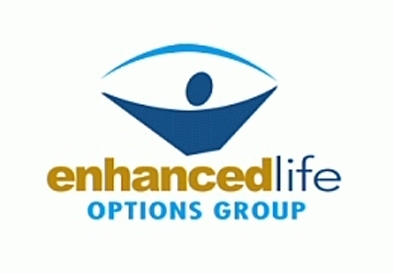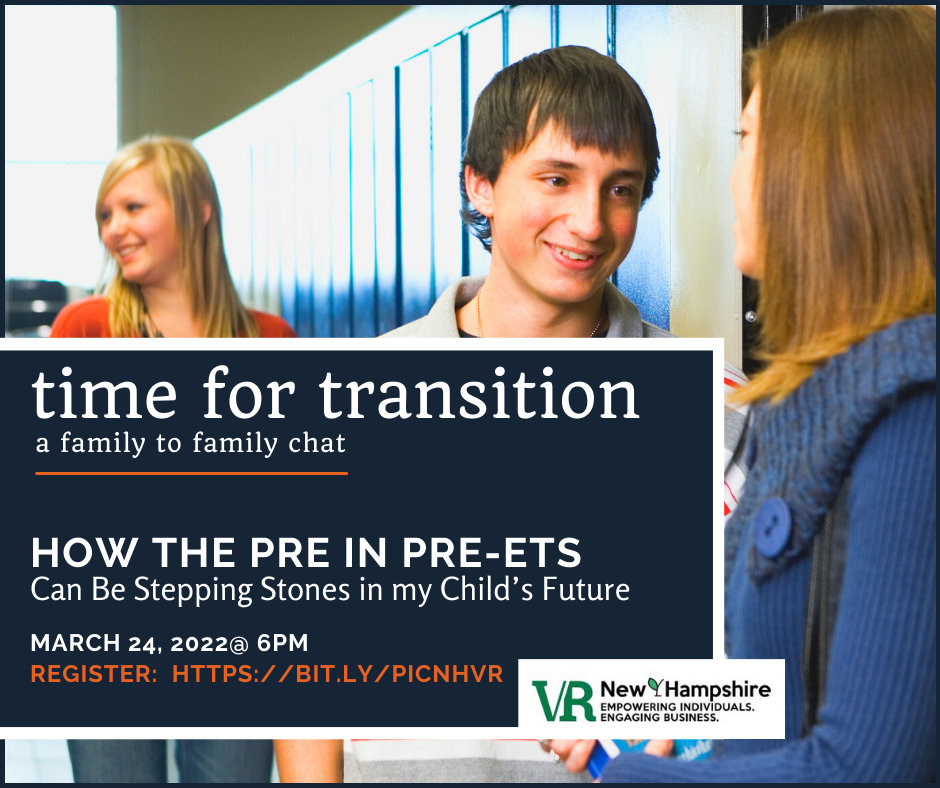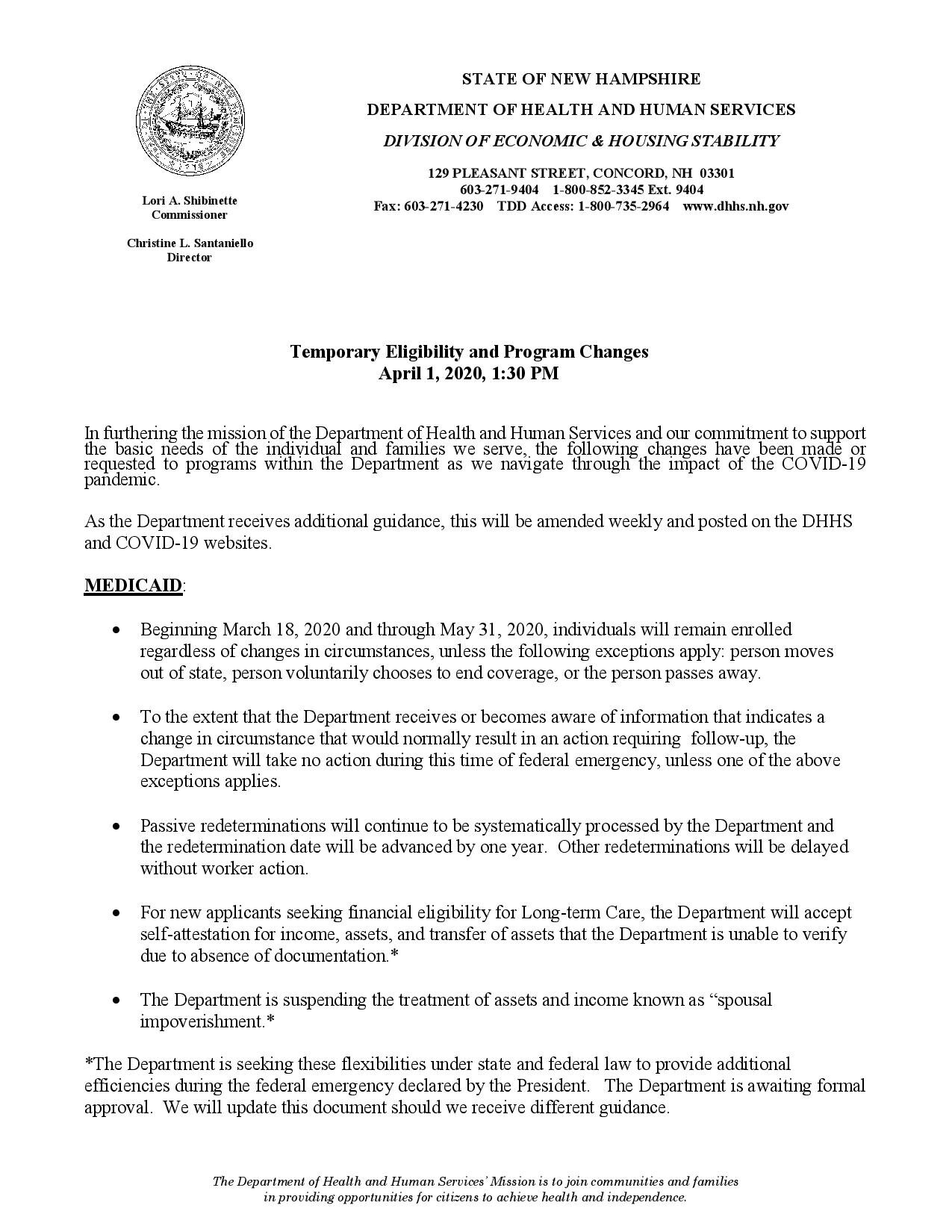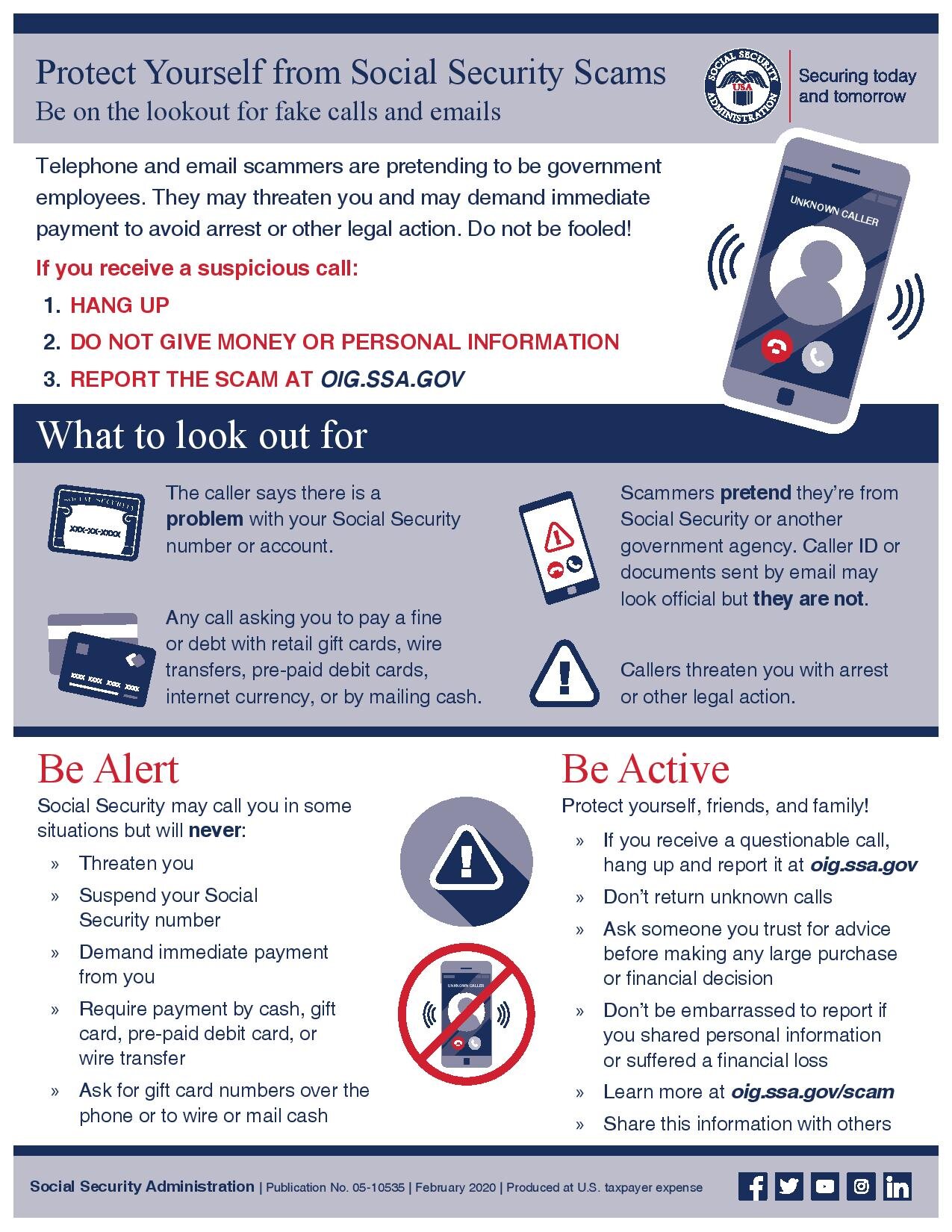Granite State Independent Living
Advocacy Alert
April 2, 2020
In This Issue
· COVID-19 Resources
· SILC Public Input Sessions Moved On-line
· Census 2020: Information and Resources
· PWDs Need Additional Resources to Protect from COVID-19
· ILRU Report on Stimulus Package
Granite State Independent Living
Advocacy Program
21 Chenell Drive
Concord, NH 03301
Phone: (603) 228-9680 or (800) 826-3700
Visit our website at: www.gsil.org
E-mail: advocacy@gsil.org
COVID-19 Resources
Governor’s Office
For additional information on the Governor’s “Stay at Home Order” go to: https://businesshelp.nheconomy.com/hc/en-us/categories/360003398073-GOVERNOR-S-EXECUTIVE-ORDERS
NH Legislature Suspended - http://www.gencourt.state.nh.us/
Small Business Development Center
The Small Business Development Center (SBDC) provides highly individualized, advising and education, to NH businesses at no cost. SBDC’s team of advisors can help businesses apply for SBA Economic Injury Disaster Loans, prepare for relief measures as they are introduced, and discuss concerns related to cash flow, staffing, marketing, accounting, supply chain interruptions, and more. Visit SBDC’s COVID-19 Assistance page for best practices and guidance from business advisors. https://www.nhsbdc.org/covid-19-assistance
The State of New Hampshire DHHS - Covid-19 info website can be found here: https://www.nh.gov/covid19/
Granite United Way Launches COVID-19 Relief Fund - Granite United Way has launched the Granite United Way COVID-19 Relief Fund, with 100% of the proceeds going directly to those impacted by the pandemic.
Volunteer Efforts in NH from Governor Sununu
NHResponds.org: This effort will serve as a secure online registration system for medical and non-medical volunteers who can quickly mobilize if needed. NHResponds is part of a nationwide volunteer management system that was established after 9/11 to get medical professionals quickly, and properly deploy them during a public health emergency or disaster.
VolunteerNH.org: New Hampshire is blessed to have many amazing non-profits which do critical work 365 days a year – and especially in times like these. Individuals interested in volunteering for a local non-profit can visit volunteernh.org to be connected with an organization in their area.
NHEconomy.com/PPEHelp: This portal will allow for all businesses to see what products the State needs, and reach out to offer assistance. The State has already heard from nearly 100 companies who are ready to adapt and adjust their operations to provide the protection, equipment, and knowledge base to stop the spread of COVID19 by either donating or producing PPE.
In-Depth NH Article - http://indepthnh.org/2020/03/31/covid-19-cases-continue-to-climb-tuesday-in-nh-to-367/
Administration on Community Living Resources on COVID-19: - https://acl.gov/COVID-19
National Association of the Deaf COVID-19 Resources: https://www.nad.org/coronavirus/
Independent Living Research Utilization Resources on COVID-19: https://www.ilru.org/resources-covid-19
Centers for Disease Control and Prevention Coronavirus Disease 2019 (COVID-19) Website: https://www.cdc.gov/coronavirus/2019-ncov/cases-updates/summary.html
SILC Public Input Sessions Moved On-line to Zoom
The Statewide Independent Living Council (SILC) is in the process of creating its 2021-2023 State Plan for Independent Living (SPIL). The purpose of the SPIL is to describe how the state’s network of Independent Living (IL) programs and services will meet the independent living needs of persons with disabilities in the state. The plan must address how federal, state and other funds will be used within the state to develop and maintain IL programs.
The key ingredient to this plan is your input! In order to be sure that the SPIL reflects and properly responds to the needs of NH’s citizens with disabilities, we need to hear from you about what your goals are, what barriers you face, and what resources would best meet your needs.
For your convenience the SILC has scheduled public On-line Zoom info sessions to receive your input.
April 14, 2020
Time: 10:00am-12:00pm
ZOOM Meeting Information
Link: https://zoom.us/j/4102417006
Call-In Number: 1-301-715-8592
Meeting ID: 410 241 7006
April 15, 2020
Time: 6:00pm-8:00pm
ZOOM Meeting Information
Link: https://zoom.us/j/4102417006
Call-In Number: 1-301-715-8592
Meeting ID: 410 241 7006
April 16, 2020
Time: 1:00pm-3:00pm
ZOOM Meeting Information
Link: https://zoom.us/j/4102417006
Call-In Number: 1-301-715-8592
Meeting ID: 410 241 7006
Inquiries for all three sessions may be directed to Jennifer.beaulieu@gcd.nh.gov or call (603) 271-2773 and ask for Jennifer Beaulieu. For alternative communication needs contact Northeast Deaf and Hard of Hearing Services at (603)224 1850 (Voice) or (603)968-5889 (VP).
Census 2020: Information and Resources
(from the American Association of People with Disabilities):
Happy Census Day!
What matters to you? Schools? Transportation? Employment? Data from the Census helps inform planning efforts for all these important community resources. To learn how census data impact you and your community. For the first time, you can respond to the census online. Responding by mail will still be an option. Get more information: 2020census.gov.
Resources
Historically, there are communities that are consistently undercounted and missed during the census, and these omissions can mean inadequate resources for things like education and healthcare. Today, a number of factors, including high levels of distrust in government, has reduced confidence in the census and may lead to unprecedented levels of undercounts in these communities that are historically missed. Therefore, it is important to bolster confidence in census data protection in order to facilitate a successful 2020 Census.
Why the Census Matters for People with Disabilities
The Census Bureau has identified people with disabilities as a hard-to-count population, which means they are at a greater risk of being under-counted in the census. The reasons for this include accessibility challenges and wider systemic inequalities. People with disabilities are also over-represented among other groups that are considered hard-to-count, such as people of color people with low incomes, and people experiencing homelessness. .
An Accessible Get Out The Count Plan
The Census Bureau has stated that the 2020 Census will be fully accessible to everyone. The Bureau has stated that it will be conducting checks to ensure that all of its electronic and information technology systems comply with the law, including Section 508 of the Rehabilitation Act.
Update on the 2020 Census for College/University Student Housing Administrators
The Census Bureau has been closely monitoring the national situation with regard to the COVID-19 pandemic and has noted that a number of colleges and universities have closed their campus housing temporarily. In light of this change, the Census Bureau wanted to convey that we are still planning to enumerate college students, but need to make adjustments in light of the closings, and to protect the health of our staff and your students, while ensuring an accurate enumeration.
Promotional Materials and Guidelines
The United States 2020 Census Brand Guidelines is a new guide that introduces the 2020 Census logo and tagline, a key messaging tool for the decennial census outreach effort. This guide is to be used for all externally focused communications materials.
Language Resources
For the 2020 Census, the Census Bureau will provide video language guides, print language guides and language glossaries in 59 non-English languages.
2020 Census: Mobile Questionnaire Assistance Operation, Project Plan
The Census Bureau proposed a Mobile Response Initiative in response to the Joint Explanatory Statement accompanying the Consolidated Appropriations Act, 2019 (P.L. 116-6). The Mobile Response Initiative proposes to incorporate the use of technology to provide readily accessible ways for people to respond to the Census. The highly mobile locations gave way to naming the operation “Mobile Questionnaire Assistance” or MQA.
Census Protection Hotlines
The Lawyer's Committee, Arab American Institute, Asian Americans Advancing Justice and NALEO have created a multilingual census hotline to help the communities you serve -- 888-Count20!
The Census is Safe and Protected
It's important that the people you serve know about and trust in the strong protections in place to protect themselves and their data. Check out this document on the census and confidentiality.
How Census Makes an Impact
From housing to healthcare, education to jobs -- the census is a crucial way to ensure communities get what they need. Here's a quick guide to help answer the big "WHY?" while in the field.
People with Disabilities Need Additional Resources to Protect from COVID-19
(from the United Spinal Association):
Earlier today, President Trump signed into law the Coronavirus Aid, Relief, and Economic Security (CARES) Act, a $2.2 trillion bill that will provide some economic relief for Americans as we continue to deal with the COVID-19 pandemic. Thank you for all your advocacy - United Spinal advocates in 41 states and DC have contacted their members of Congress.
The SCI/D community achieved important priorities in this bill including: increased funding for Aging and Disability Resource Centers, Administration for Community Living Aging and Disability Services Programs, and an extension of Money Follows the Person funding through November 30, 2020 (see attached for more information).
We have another opportunity to focus Congress’ attention on critical issues for the disability community and you can take action here: Action Alert
What we need:
more funding for Medicaid home and community-based services (HCBS).
increased availability and protections for personal care attendants and other caregivers.
to extend funding for Money Follows the Person program permanently and get as many people as possible out of nursing homes, where there is a clear risk of COVID-19 infection.
advocate strongly against discrimination against people with disabilities in the provision of health care.
HOW YOU CAN HELP: We are creating a Coronavirus Storybank
Please send the United Spinal Advocacy & Policy staff your stories at advocacy@unitedspinal.org and we will make sure Congressional leadership hear us and hear about the challenges our community is facing.
Our community is strong. We will get through this together. THANK YOU.
ILRU Respectability Report: Stimulus Package Becomes Law
Here's What It Means for People with Disabilities
(from the Independent Living Research Utilization program):
The IL-NET National Training and Technical Assistance (T&TA) Center at ILRU is providing support to centers for independent living and statewide independent living councils as we all navigate the unprecedented times of the Coronavirus (COVID-19) pandemic. We are sharing this resource below in support of the communities you serve. Please email us at ilru@ilru.org with examples of how you are communicating with consumers in your communities and the resources you have found helpful. Visit the ILRU Resources on COVID-19 webpage for daily updates.
The following is a summary of how the stimulus law will affect persons with disabilities and disability organizations. The report was published last Friday, March 27, by Respectability’s policy lead, Philip Pauli. The Respectability website describes Respectability’s role as “…ensuring children and adults with disabilities receive the education, training and employment opportunities they need to succeed.”
The hard news reporting comes from a disability rights perspective, which many readers will accept and appreciate. The below report includes a call to action. CILs, SILCs, and other recipients of federal funding are cautioned to observe prohibitions against the use of federal funds for lobbying.
The text of the Respectability report is included below.
Stimulus Package Becomes Law – Here’s What It Means for People with Disabilities
Washington, D.C., March 27 – President Trump signed into law today the $2 trillion-dollar emergency stimulus aimed at propping up the economy during the current crisis. This law is unprecedented in its scope and is meant to help our nation respond to the COVID-19 pandemic. Even now, government agencies are going to work to implement the new law.
Millions of Americans living with disabilities are wondering what this new law means for them and whether they will see any benefit. The short answer is yes, but how far the law will go to help people with disabilities who are uniquely at-risk to the impact of the virus remains an open question.
Checks for Individuals With and Without Disabilities
Individuals with and without disabilities who are struggling right now will be receiving a Recovery Rebate. This rebate will be a one-time cash payment sent from the government to all U.S. residents with adjusted gross income up to $75,000 ($150,000 if you are married), with a phaseout for incomes between $75,000 and $99,000 ($150,000-$198,000 if you are married), who are not a dependent of another taxpayer and have a Social Security Number.
The amount of that check will be $1,200 for eligible individuals and $2,400 for people who are married, plus $500 per dependent child. This is being characterized as a rebate, which means it will NOT be counted against the asset limits faced by people with disabilities if spent within 12 months of receipt.
However, people with disabilities who are on Supplemental Security Income (SSI) will have to file their taxes. This could create a major burden for many of the poorest people with disabilities and other low-income communities, many of whom may find access to filling out the forms a challenge.
Unemployment Support for More Workers
This bill includes major changes and supports for the unemployment insurance (UI) system under the U.S. Department of Labor (DOL). Unemployed workers with and without disabilities will receive $600 increase in their weekly checks. The bill also creates a Pandemic Unemployment Assistance (PUA) that expands UI coverage. Critically that coverage has been expanded to include self-employed workers, gig workers, and independent contractors.
This is great news for many people with disabilities who engage in the gig economy, drive for ride-share services or run their own small businesses.
Support for Teachers and Students With Disabilities
Teachers and special educators are facing significant challenges around how to provide a free, appropriate public education to students with disabilities when you can only connect through a computer screen. The bill will give states more than $30 billion dollars to provide Emergency Education Relief grants to help teachers and students with and without disabilities to make the switch to online learning and virtual classrooms.
These grants will specifically help teachers meet the needs of students with disabilities in these trying times. Likewise, some of those funds can be used to provide summer learning, supplemental after-school programs and online learning for students with disabilities.
Disability advocates had been very concerned that the original bill included several provisions waivers from the explicit requirements of laws such as Individuals with Disabilities Education Act (IDEA). The new version of the bill requires the Secretary of Education to report to Congress within 30 days about where, how and why waivers are being used and students with disabilities are accessing online learning.
The Stimulus Package Helps Organizations Serving the Disabilities Community
The bill will distribute $955 million for Aging and Disability Services Programs under the mandate of the Administrative on Community Living (ACL). That money will support nutrition programs providing people with disabilities and older Americans with food deliveries as well as direct support for family caregivers.
That amount also includes $50 million dollars for aging and disability resource centers across the country as well as $85 million dollars for Centers for Independent Living (CILs). Further, the bill invests $15 million dollars to support housing specifically for people with disabilities.
Addressing the critical issue of Direct Support Professionals (DSPs) who help people with disabilities, the CARES Act will now allow state Medicaid programs to pay for DSPs to help people with disabilities who end up in the hospital. This should provide some reassurance for people with disabilities who need support for activities of daily living, but many other needs regarding DSPs and maintenance of the DSP workforce through this crisis remain undressed.
What Is Missing From The Bill?
The CARES Act does not address the life or death issue of medical rationing facing the disability community in this moment of crisis. As the crisis intensified in Italy, the government rationed healthcare away from people with disabilities. This approach already is illegal under American law, but it still happens, nonetheless. In this time of crisis, the state and local leaders making on the ground decisions need to hear a clear message about treating people with disabilities equally.
The Stimulus Package Leaves Out Paid Sick Leave
Unfortunately, this bill does not include any additional provisions to help workers who do not already receive paid sick leave or who are now receiving sick leave through the earlier Families First Coronavirus Response Act.
People with disabilities must know they are secure in this time of crisis. Thus, further advocacy is needed to cover these gaps in coverage and ensure that family members who need to take leave in order to meet the critical needs of their loved ones are covered.
The Stimulus Package Does Nothing for Immigrants and People in the Justice System
Lastly, the bill does nothing to support some of the most vulnerable people with disabilities in America today. The bill contains no mention whatsoever about immigrants (with or without disabilities) or people who are incarcerated. Census Bureau data shows that there are more than 44 million immigrants living in the United States and out of that number, up to 6 million are probably living with a disability. How are they going to be helped or harmed by this bill? There are no clear answers yet. Likewise, there is no relief or support for the estimated 750,000 people with disabilities who are currently imprisoned.
If you would like to know more about how COVID-19 is impacting the disability community, we encourage you to review and make use of the following resources and materials:
https://www.respectability.org/covid-19/
https://acl.gov/COVID-19
Ryan Donnelly
Advocacy Coordinator
Granite State Independent Living
Tools for Living Life Independently
Home Care • Community Supports • Employment Services
21 Chenell Drive| Concord, NH | 03301
Office: (603) 228-9680 x1125 | (800) 826-3700 (V /TTY)
Visit our website at: www.gsil.org




















